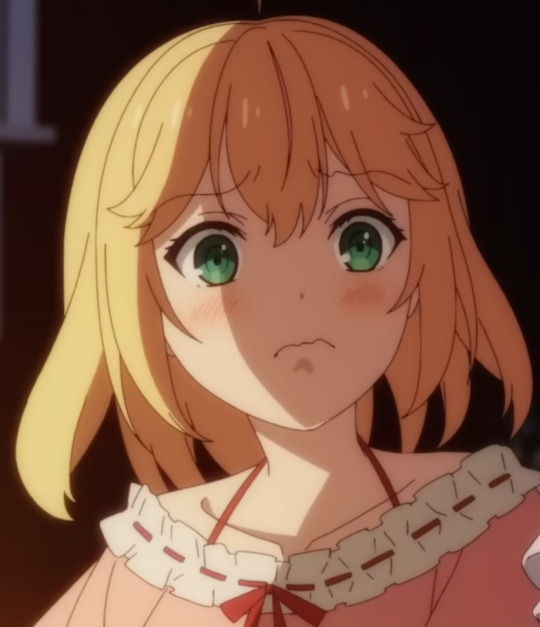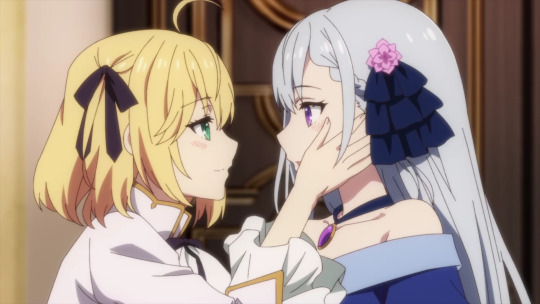#euphyllia
Explore tagged Tumblr posts
Text

I literally just found out about it, but yeah
Happy Yuri Day !
#yuri#yuri ship#happy yuri day#yuri day#edited#editing#edit#acheron#black swan#acheswan#luz noceda#amity blight#lumity#anisphia wynn palletia#euphyllia#anis x euphie#rei taylor#claire francois#rei x claire
60 notes
·
View notes
Text


Blondie being a disaster for her gf
#magirevo#the magical revolution of the reincarnated princess and the genius young lady#tenten kakumei#tensei oujo to tensai reijou no mahou kakumei#euphie#euphyllia#euphyllia magenta#anis#anisphia#anisphia wynn palletia#anis x euphie#rwby#rwby9#rwby v9#rwby volume 9#blake#blake belladonna#yang#yang xiao long#bumbleby
222 notes
·
View notes
Text



Coral photos by David Hall
Photo 1: brain coral (family Faviidae)
Photo 2: genus Acanthogorgia
Photo 3: polyped stone coral (genus Euphyllia)
#coral#brain coral#cnidaria#Faviidae#Acanthogorgia#Euphyllia#polyped stone coral#colorful coral#marine#sea#ocean#coral reef#reef#green#green coral#red#red coral#animals#sea life#marine life#nature#abstract#abstract nature#coral photography
58 notes
·
View notes
Photo


Anis & Euphie, my new fav lesbian couple! Happy pride month ~! 🌈 It’s a screenshot redraw from a GL anime.
#tensei oujo to tensai reijou no mahou kakumei#euphyllia#anisphia#girl's love#shoujo ai#gl anime#hopebun
98 notes
·
View notes
Text

#oficial art#転天アニメ#tenten kakumei#magical revolution#the magical revolution of the reincarnated princess and the genius young lady#magirevo#anisphia wynn palletia#anisphia palletia#anisphia#anis#euphyllia magenta#magenta euphyllia#euphyllia#euphy#tensei oujo to tensai reijou no mahou kakumei#tensei oujo#転生王女と天才令嬢の魔法革命
42 notes
·
View notes
Text
My crush: "I'm falling for you"
Me:
#finally catching up#been waiting to binge tbh#tensei oujo to tensai spoilers#tensei oujo to tensai#oujo to tensai reijou no mahou kakumei#the magical revolution of the reincarnated princess and the genius young lady#anis x euphie#anisphia wynn palettia#anisphia#euphyllia x anisphia#euphyllia#euphie#euphie x anis#euphyllia magenta#magirevo#anime
60 notes
·
View notes
Text
I love this thang
#video#coral#reeftank#yellow tang#damselfish#clownfish#torch coral#Euphyllia#fishblr#aquablr#aquarium
4 notes
·
View notes
Text













ねこもち❀
#anime icons#anime gifs#tensei ojo to tensai reijo no maho kakumei#anime pics#euphyllia#anisphia#ユフィリア#アニスフィア#euphy
12 notes
·
View notes
Text

Pokemon team for Euphyllia Magenta from The Magical Revolution of the Reincarnated Princess and the Genius Young Lady!
Full team consists of: Gardevoir, Shiny Milotic, Aegislash, Armarouge, Alolan Ninetales and Chandelure
[requested by anon]
Armarouge sprite source: https://reliccastle.com/resources/1101/
#the magical revolution of the reincarnated princess and the genius young lady#euphyllia magenta#euphyllia#pokemon#submission#gardevoir#milotic#aegislash#armarouge#ninetales#chandelure#shiny pokemon
10 notes
·
View notes
Text

#The Magical Revolution of the Reincarnated Princess#Tensei Ōjo to Tensai Reijō no Mahō Kakumei#Tensei Oujo to Tensai Reijou no Mahou Kakumei#euphyllia magenta#anisphia wynn palettia#anisphia#euphie#euphyllia#anime#anime gif
2 notes
·
View notes
Text

The Magical Revolution of the Reincarnated Princess and the Genius Young Lady (Review; Contains Spoilers)
In the Kingdom of Palettia, we follow an odd princess named Anisiphia. Ever since she was a child, she loved magic, but she was unable to use it herself. However, thanks to her memories of her past life, she uses her knowledge to create several devices with the hopes of achieving her lifelong dream: to fly.
During one of her test runs, she accidentally crashes her broomstick and witnesses her brother Algard publicly renouncing his arranged marriage to Euphyllia choosing a commoner over her. With her reputation in flames, Anis interferes and decides to "take Euphyllia away."
Thus begins the story of The Magical Revolution of the Reincarnated Princess and the Genius Young Lady which was based on a series of light novels. So, my thoughts?
Positives:
The animation is pretty good. As are the OP and ED themes.
While I will get into more of the problems with the characters, found a good bunch of them likable.
Voice work is good especially when it goes into making a character sound emotionally wrecked.
The Negatives:
Worldbuilding is weak. For instance, there comes a point where there was a way for Anisiphia to avoid inheriting the throne which, naturally throws her into conflict with Euphyllia. A lot of this does come from the result of truncating for time or omitting moments from the light novels. Oftentimes, scenes get boring likely because of all the political talk on who inherits the throne and all.
The characters are static and ultimately are back in the places where they were introduced. Anisiphia, while she makes up several of the comedic moments of the anime, is an example. With her, we know that her main motivation is to "fly" and that she loves magic due to her memories of her past life. Beyond that, she never really gets into conflict that would seriously make her reconsider.
In the penultimate episode, we have Anisiphia truly being in a dilemma: due to a convoluted series of events, she is once more in line to be queen. This could have been a chance for Anisiphia to grow as a character. She is in a position where she has a heavy weight on her shoulders and thinks becoming queen would be her atonement for the mistakes she had done. This would mean that she would have to grapple with whether that meant ending her research something that gave her joy, but perhaps it was in the kingdom's best interest for her to stop living in her fantasies. Or what if she made it to where she could implement her research in her rule?
All those interesting questions are literally solved the moment Euphyllia interjects. Speaking of her...
Euphyllia was established as being someone who was molded to be "perfect" as in doing what was expected of her instead of making her own choices and we see the conflict of that once her reputation was tarnished. She is even asked this directly by Tilly. So...my issue?
Because of the deus ex machina I have mentioned, she can inherit the throne so that way, Anisiphia would not have to lose what she loved. I'm sorry...what? I know that the anime tries to say "she was making her own decision and she wanted Anis to be happy." But that is not making her decision for herself, that is making decisions for someone else. She is living for Anis not herself.
Worse is that she does not console Anis on this rash decision and seemed to not think much about it. Except for the fact that should she become a spirit, not only will she be immortal, but she will forget even her memories of being human including her time with Anis. How did she think Anis would be happy that Euphyllia was making that huge a sacrifice?
The other characters are hit-or-miss, but mostly "hits." Ilia is a deadpan snarker of a maid who tends to get annoyed with Anisiphia's antics. Laine, the girl that Algard chose over Euphyllia, and Tilly, who is probably the best one. She is the vitriolic best friend of Anisiphia and her polar opposite: while Anisiphia loves magic, Tilly sees it as a curse. She is also likely the only one who truly understands her.
The anime can also have times where the emotions are contrived though I did find myself pitying some of the characters despite that.
= 7/10
#the magical revolution of the reincarnated princess and the genius young lady#review#euphyllia x anisphia#anisphia#euphyllia#anime review
5 notes
·
View notes
Text
Although some of the larger marine flatworms are photogenic enough, to appear regularly in reef life guides and aquarium books, the mention of flatworms in reef aquariums usually relates to a small number of species, that are often labelled 'redbugs', or that actively eat coral tissues. These species are smaller, not so visually striking, and widely regarded as pests and not pets. This leads often to senseless panic, when quite harmless species of flatworms are encountered, such as Amphiscolops - not all of such 'hitch hiking' flatworms are bad.
However, conflicts do arise from the presence of corallivorous flatworms, such as those plaguing the acroporid corals, and the red or rust 'planarian' genus, or Convolutriloba, which accommodate photosynthetic symbionts. Convulotriloba sp. are not, as is often misreported, actual coral eaters themselves. Rather they compete with photosynthetic corals for access to light, and their populations can increase so fast, through fission, that they can simply swamp out the growing corals beneath them.
These flatworms are toxic, involving tetrodotoxin, and this defence seems to deter most foragers from guzzling them. Toxicity problematizes the potential of chemical treatments, because when the Convolutriloba flourish in quantities, their mass death causes the stressed and dying animals, to secrete toxins into the aquarium water. So although a chemical treatment might not itself harm corals etc, it can still be disastrous. As an aside, this genus dislikes settling where it is subject to strong current, and is therefore less likely to be troublesome in high flow systems or locations.
A number of fish and crustaceans will eat Convulotriloba sp. and other 'pest flatworms', but not eagerly enough for them to control their numbers properly, and this is likely because they bear toxins. So that a number of carnivorous foragers may nibble at Convulotriloba numbers, but are not willing to wulf them down, as aquarists would like them to. This fits what I and others have seen of foraging dragonets, wrasse, butterflyfishes, arrow crabs, and boxing shrimp. A closer examination may show that the worms are more often rejected after sampling as potential food.
The falsely named 'blue velvet nudibranch' - which is really a headshield slug, Chelidonura varians - reportedly dies after consuming only Convulotriloba. In nature Chelidonura sp. have a broad diet, including molluscs moreso than flatworms. Like the other foragers that consume red flatworms, their nature is surely to sample vagile animals, and then move on. In truth, chemically well defended organisms such as Convulotriloba sp. might not be immune to sporadic predation, but their arsenals would not have come to exist through natural selection, were they ineffective against bulk consumption.
More than one species of Convulotriloba is encountered in aquariums, but there is probably little need to fret about their identification. Another less notorious genus named Waminoa, has a similar carpeting habit, resting upon coral tissues, but is seemingly not so toxic to other animals, or their toxicity is not so well studied. Less is reported about Waminoa in relation to corals or other sessile organisms, or to their potential predators. It seems the usual flatworm consumers will eat them.
The other dreaded flatworms actually are obligate coral feeders, the Acropora and Montipora eating polyclads. Fortunately a number of regularly encountered reef fish and shrimp, will eat these flatworms at different stages of there life cycles. Pseudocheilinus wrasse are certainly proven to consume them under observation, although they appear to spit out Convulotriloba. The peppermint shrimps, a species complex of broad spectrum foragers, consume both the adult worms and their eggs. These are the same shrimp admired for their consumption of Aiptasia anemones, but for that reason they could also consume corals themselves.
Specialized coral feeding polyclads also bother other corals such as euphyllids, particularly Euphyllia senso stricto and the related Fimbriaphyllia, and may cause more damage than is often recognised. This is because the feeding of certain (but not all) polyclad flatworms on coral tissues, clearly damages and behaviorally stresses these corals. But the corallivorous flatworms may be difficult to spot, and to recognize for what they are, and problems with euphyllid polyp expansion are likely to often remain undiagnosed. A mixture of temporary dips and natural biological control is advised, but the strong stings of euphyllids may ironically deter flatworm eaters.
#pest flatorms#reef pests#biological control#red planarian#red flatworm#rust flatworm#Chelidonura varians#blue velvet nudi#blue velvet nudibranch#Convulotriloba#redbugs#acropora#montipora#corallivores#wrasse#shrimp#Waminoa#Euphyllia#Fimbriaphyllia
1 note
·
View note
Text

Anis fell first but Euphie fell harder UWOOOOOOOOOOOOOOOOOOOOOO
#tenten kakumei#the magical revolution of the reincarnated princess and the genius young lady#magirevo#anis x euphie#euphie#euphyllia magenta#euphyllia#anis#anisphia wynn palletia#euphyllia x anisphia#anisphia
372 notes
·
View notes
Link
#acquariodelmese#acquariodelmesemarino#AndreaMinnella#DeltecSC1455#euphyllia#Euphylliaancora#Euphylliaglabrescens#Euphylliaparaancora#Hydra26HD#JebaoDCP3000#layout
0 notes
Link
#acquariodelmese#acquariodelmesemarino#AndreaMinnella#DeltecSC1455#euphyllia#Euphylliaancora#Euphylliaglabrescens#Euphylliaparaancora#Hydra26HD#JebaoDCP3000#layout
0 notes
Text


#oficial art#転天アニメ#tenten kakumei#tentenkakumei#the magical revolution of the reincarnated princess and the genius young lady#magical revolution#tensei oujo#tensei oujo to tensai reijou no mahou kakumei#magirevo#the magical revolution#PrincessGeniusFan#anisphia palletia#anisphia wynn palletia#anis#anisphia#euphyllia#転生王女と天才令嬢の魔法革命#euphya#euphylia magenta#magenta euphyllia#magenta euphylia#euphyllia magenta#euphie#magenta euphilia
50 notes
·
View notes